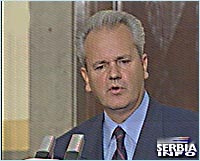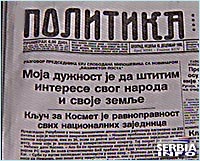
| |||||
December 16, 1998
 President of the FRY Slobodan Milosevic |
- We do not have a problem with any national community, and there is 26 of them, except with a part of Albanian national community in Kosovo, those who are engaged in a separatist movement. The nature of this movement Nazi.
- We shall never give away Kosovo.
- If we were to apply the rules according to which Krstic was arrested, half of the population of Bosnia and Herzegovina should be arrested and sent to The Hague.
- The Serbs are the victims of the latest holocaust in this century. I think that we can have good relations with Germans. I think that Germany is through with Nazism. They are no longer a Nazi country. They are a developed country, with developed democracy.
- We considered that Yugoslavia was a good solution for the national interest of the Serbs, because in the former Yugoslavia all Serbs lived in one state.
- Albania is a factor of instability of the entire region.
- Albanian nacro-mafia gives money to foreign journalists and politicians for the media war against us and that money is blood money, paid by the lives of young people from Western Europe, America and Canada.
- But if America really wants to accelerate the process of economic reconstruction, democratization and everything else they scream about, it should lift all sanctions.
- USA believes it can resolve everything by force and that is the weakness of many great powers that perished in the past.
- The Balkans people should have a common goal - to live in peace and affluence and not in poverty and war.
- We do not arrange our country in line with the interests of others, but according to our interests.
- The right to truth is one of the principles of freedom.
- When national interests are at stake, there is no difference between the authorities and the opposition.
Yugoslav President Slobodan Milosevic talked with Elizabeth Weymouth the editor of the Washington Post.
This two-hour conversation referred primarily to the issues of Kosovo and Metohija as well as to relations between Yugoslavia and the United States of America, civil war in Bosnia and Herzegovina, freedom of information in our country, University law, International War Crimes Tribunal, relations in the Yugoslav federation, Yugoslav Constitution, reasons for break up of former Yugoslavia, President Milosevic's family, almost everything that the American journalist wanted to ask.
How interesting was this conversation proves the fact that the Washington Post journalist asked 233 questions in a very dynamic tone.
The Politika presents hereunder the translation of the taped record of this conversation in the sequence it was led, without the systematisation of individual topics:
Question: Is there anything in particular that you want to say to the Western public?
- The entire western story of the Yugoslav crisis is false, particularly on Serbia. I think that this is the failure of journalism, moral failure of journalism. Western story is far from truth. It can be said that many things presented to the foreign public about this country are simply not true. I therefore hope that your visit will contribute to a true picture.
Q: What do you think about James Rubin's statement of last week?
- There were several statements.
Q: I think he said that you are "the problem"? What do you think about that? Do you have any response?
- My duty is to protect the interest of my people and my country. If anyone has a problem with that, I can only tell you that I am proud of my role in defending and protecting the interests of my country and of my people.
Q: Do you think that the US changed its policy? There were some rumours on the CNN last week, that the US changed its policy and that now they are trying to oust you? Do you believe that?
- This is not a question of a personal position of any individual. This is a question of a political approach to the problems in Yugoslavia and the problems in Kosmet. We consider Kosmet our internal affair and believe that this problem can be resolved only by agreement between the representatives of different national communities living there. I firmly believe that the problem cannot be resolved by outside solutions. People who live there should arrive at an agreement.
Q: So you are saying that you will not accept the US plan, as presented by Ambassador Hill?
- Each initiative directed at peaceful resolution is welcome as an initiative that can be taken into account. This is one side to it. But essentially, the problems in this country have to be resolved by people living in this country.
Q: As far as I understand, the problem is that the people from Kosovo, namely the Albanians living in Kosovo, who are the predominant population, seek independence. The Serbs in Serbia wish to keep Kosovo as a part of Serbia. Is compromise possible and if so, is Ambassador Hill's plan a possible compromise? What extent of autonomy will you give to the people of Kosovo?
- That question is not understood by many outside this country.
Q: You mean, it is not well understood between you and Holbrooke?
- Kosmet is primarily, a part of Serbia, which has always been a part of Serbia. Always, throughout history, for centuries.
Q: Always has been and always will be?
- Always has been and of course always will be. Why would it be any different in the future. Only in Kosmet, there are 1800 Serb, Christian churches, on Weber's list, a famous ecologist. This is where different national communities live - Serbs and Montenegrins, Albanians, Muslims, Egyptians, Romanies, Turks. The approach of the Serb Government and all political parties and citizens of Serbia is that nationalities living there have to be equal. So, when we speak of the solution to the problem of Kosovo...
Q: You mean, you and Holbrooke?
-No, I do not mean only Holbrooke and me. Whenever we spoke with Holbrooke and Hill, with any foreign representatives and among ourselves, in general, we always thought that the problems can be resolved only on the basis of the principle of equality of all citizens living in Kosmet and all national communities living in Kosmet. So, if any national community, Albanian, Turkish, Muslim or any other, wishes to have self-governance - there are not limitations in that.

|
- Not independence. Self-governance of national communities within limits.
Q: Is that appropriate?
-Absolutely. And if there are some limits, those are the rights of other national communities living in Kosmet. So, no national community living in Kosovo, among those I mentioned, cannot rule over the others. All national communities have to be equal. They have to have equal rights.
Q: OK, but I see it like this. You probably know more but I understand that the KLA, as we call it, is much stronger than other Albanian forces, and that moderate forces lose power. The question is whether the cease-fire will hold. And, on the long term basis, the question is how will you come up with an arrangement that will satisfy the local Albanians - great number of Albanians living there who wish independence. On the other hand, the Serb people wish to keep Kosovo within Serbia. Will you give them actual autonomy, the possibility to run their lives, their legislation, possibility to administer their towns as the Israeli gave the Palestinians the right to administer the towns on the West Bank?
- This is different from the Palestinian question. Simply, we never discussed, including in our talks with the representatives of the international community, Holbrooke and the others, any kind of independence. Independence implies the secession of a part of Serbia. Disintegration of Serbia. No one in Serbia can agree with secession of any part of its country.
Q: I understand. But the question is what level of autonomy would you accept within Serbia?
- I tried to explain to you that each national community living in Kosovo can have autonomy, in questions that concern them.
Q: Do you think that it would satisfy Albanians?
- It will not satisfy Albanians who seek independence. This is clear. We have no illusions about that. But it is a kind of compromise, which means that they can have their autonomy within Albanian community. But the same kind of self-governance has to be enabled to Muslims, Turks and others living in Kosovo and Metohija. So, all of them have to be treated equally. This is the difference. We never spoke of any possibility of independence of Albanians. In order to understand the situation in our country, you have to appreciate one fact - there are 26 different national communities in Serbia. All of them are equal. Look, for example, at the Hungarians in the north. They are quite well integrated in Serbia. They have their own schools in Hungarian, their publishing houses, radio and TV programmes, papers, practically everything. We have no problems with them. No problems with Slovaks, Bulgarians, Ruthenians and others. The problem in Kosmet was not a problem with Albanian national minority as a whole. Albanians are good people and one of equal national minorities in Serbia. The problem in Kosmet is a problem of a separatist movement of one part of Albanian national minority. One part of Albanian national minority in Kosmet is manipulated by groups of Albanian politicians, who are Nazis. I will tell you why they are Nazis. Because their proclaimed goal is an ethnically pure state. I do not know if there is any ethnically pure state anywhere in Europe.
Q: It is strange coming from you, because we in America are under the impression that that was the goal of Bosnian Serbs when they were killing in Bosnia.
- There was a civil war in Bosnia between the Muslims, Serbs and Croats. No one in Bosnia pursued a goal of an ethnically pure Bosnia. It would simply be impossible. But now that you mention Bosnia, the case of Bosnia was resolved in Dayton only because the formula was reached to equally protect the interests of all three peoples living there. That was our approach since the beginning of the crisis in Bosnia. You can see the papers from that period and see that. Since the beginning of crisis in Bosnia, our approach was that there is only one formula which can bring peace, and that is the formula which will equally protect the interests of all three peoples - Serbs, Muslims and Croats. So, that was achieved in Dayton. Now, the Serbs have their institutions, the Croats and Bosniaks have theirs and they can live together. That is no longer a problem.
Q: But allegedly there was a connection between your Government and Bosnian Serbs, wasn't there?
- What connection?
Q: Allegedly, according to our Government, there was a strong connection between Bosnian Serbs and your Government.
- Between the Serbs in Serbia and the Serbs in Bosnia.
Q: Right.
- Is it not normal and logical that there are connections between the Serbs from both sides of one river. They lived in one country - former Yugoslavia. All the time. Why would those connections be strange?
Continuation of interview:
- Only civilians were innocent who suffered the consequences of the horrors of war
- We have market economy
- Laws equal for all
- We do not arrange our country in line with the interests of others
[ Home | Encyclopedia | Facts&Figures | News ]
Copyright © 1998, 1999 Ministry of Information
Email: mirs@srbija-info.yu